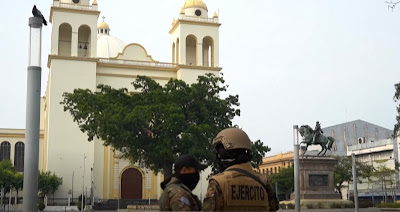Impact of State of Exception on Religious Freedom in El Salvador
The US State Department issued its 2022 country report on International Religious Freedom for El Salvador last week. The annual reports are issued for countries around the world and describe the ability of residents in a country to freely practice their religious faith. This year's report notes the varied impacts of the State of Exception on churches throughout El Salvador, particularly on those church leaders who worked in gang-controlled communities or sought to rehabilitate and extract persons from the gangs.
The State Department report mentions some positive impacts of the State of Exception on religious freedom. In the second half of 2022, persons in formerly gang controlled communities felt freer to travel to religious services and activities, including those that involved crossing gang boundaries. Extortion of religious bodies by gangs has declined with the breakup of gangs by security forces.
However, the report also notes that the Salvadoran government has been hostile towards, including arresting and detaining, evangelical Christian pastors who labored to address gang issues:
In March, police arrested William Arias, a pastor who worked with former gang members to reintegrate them into society. Arias had been a member of MS-13 but had left the gang more than 10 years earlier. Arias remained in detention at years end.
In an August 12 interview with the French newspaper Le Monde, Vice President Félix Ulloa responded to criticism of arbitrary detentions under the State of Exception by stating that 80 percent of evangelical Christian pastors belonged to gangs. In response, the Evangelical Alliance of El Salvador issued a statement refuting Vice President Ulloa’s statement, saying, “We consider the statements made by the Vice President when he says that 80 percent of pastors are part of these gang structures to be offensive.” Following Ulloa’s statement, Pastor Mario Vega of the Elim Pentecostal Church told an interviewer on a radio program there was religious persecution in the country, saying that the expression of his religion included promoting “truth, transparency, honesty and solidarity,” and that for doing so, he had been discredited, insulted, and threatened. Referring to Ulloa’s statement, Vega said he was not concerned about government-directed violence but worried the Vice President’s statement could incite others to violence against evangelical Christian pastors.
According to a June article in America – The Jesuit Review, an evangelical Christian pastor who works with former gang members said the State of Exception would make his work more difficult. “I’ve been accused of being a pastor for gangsters, but I know I must stay true to my calling. Fewer people will want to sign up for this work after the government’s actions,” said the pastor.
In the Salvadoran press there have been several other reports of the arbitrary detentions of evangelical pastors during the State of Exception. A 32 year old pastor from San Miguel died two months after being detained under the current security regime. Mario Davis Arias Rivera, 44, a pastor and school director, was arbitrarily detained on May 10, 2022, according to family and church members, during a dinner celebrating Mother’s Day as part of a church meeting. He died a month later in prison, which family members attribute to beatings and failure to provide his medication for diabetes. Another pastor was detained last June in Chalatenango.
In El Salvador Perspectives, I have written numerous times about the phenomenon of gang members converting to evangelical Christianity within prisons and leaving the gangs. There is a collection of articles linked here. See as well this 2019 article from the Washington Post: Reform and revival: Gang members find Christianity in El Salvador prisons.
The current approach of the Bukele government to describe evangelical pastors as gang members, to lock up tens of thousands without allowing access by evangelical or other religious figures to the prisons, and to reject rehabilitation as a goal of incarceration, destroys one of the few processes seen as successful in recent years to rescue individuals from the gangs. Added to this, there are numerous reports of persons who had left the gangs after in-prison conversions, being re-arrested under the State of Exception on the outside, solely based on their former membership with no indication they had returned to life in the gang. A Los Angles Times article titled They left gangs and found God. But they weren’t spared in El Salvador’s crackdown details the impact this policy is having.
Finally, there is the example of the government's antagonism towards anyone speaking from a position of religious faith to question the policies of the Bukele regime and its ongoing suspension of constitutional rights and liberties. The allies of the government viciously attack on social media prominent Salvadoran religious figures, like the Jesuit leaders of the University of Central America, Roman Catholic Cardinal Gregorio Rosa Chevez, and the lead Pastor of Elim Church, Mario Vega, who have all publicly denounced violations of human rights under the State of Exception.

Comments